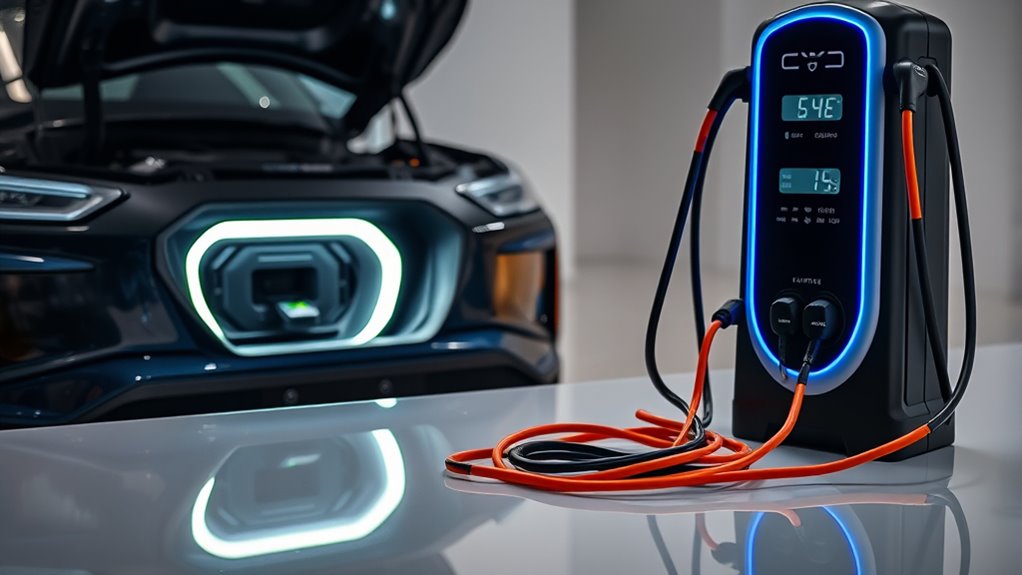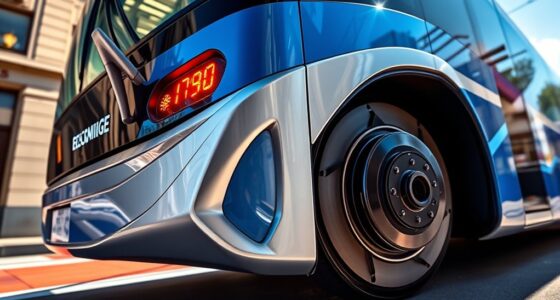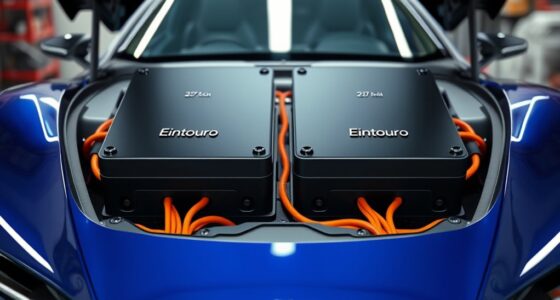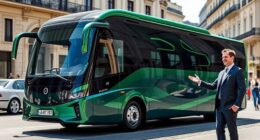On-board chargers are built into your vehicle, making everyday charging simple and compatible with many stations, but they often offer slower charging speeds. Off-board chargers are external, providing faster charging and supporting higher power levels, perfect for long trips. However, they require specialized infrastructure and setup. Your choice depends on your driving habits—if quick charging is a priority, off-board options excel; for convenience, on-board chargers work well. Keep exploring to discover more about how these options can fit your lifestyle.
Key Takeaways
- On-board chargers are integrated into the vehicle, offering convenience and compatibility but with slower charging speeds.
- Off-board chargers provide faster charging with higher power capacity but require specialized infrastructure and external setup.
- On-board chargers simplify daily charging without additional equipment, while off-board chargers are ideal for quick long-distance recharging.
- Off-board chargers support advanced standards and future infrastructure upgrades, whereas on-board chargers are more universally compatible.
- The choice depends on driving habits: daily use favors on-board chargers, while frequent long trips benefit from off-board rapid charging.

When choosing between on-board and off-board chargers for your electric vehicle, understanding their differences is essential. Your decision impacts how seamlessly you can charge your EV, how quickly you can get back on the road, and how well the charging infrastructure supports your needs. On-board chargers are built directly into the vehicle, handling the conversion of AC power from your charging station into the DC power stored in your battery. This integration simplifies the process, allowing you to plug in just about anywhere and start charging without additional equipment. However, because the on-board charger is limited by space and design constraints, its power capacity tends to be lower, often resulting in slower charging times, especially at standard public charging stations. The benefit here is that you don’t need separate equipment, which can make on-board chargers more convenient for everyday use and compatible with a broad range of charging infrastructure.
Off-board chargers, on the other hand, are external devices that handle the power conversion outside of the vehicle. They’re designed for faster charging, often providing higher wattage levels, which considerably reduces charging times. This setup is particularly advantageous if you’re frequently on long trips or need quick turnaround times between charges. Because off-board chargers can be more powerful, they often require dedicated charging stations equipped with appropriate infrastructure to support higher power levels. Installing off-board chargers at home or commercial locations involves planning for robust charging infrastructure, including high-capacity power supplies and safety measures. While they demand a bit more initial setup, off-board chargers can future-proof your charging needs as infrastructure continues to evolve and support faster charging standards. Additionally, advancements such as generative AI are influencing the development of smarter, more efficient charging systems, making off-board solutions even more appealing.
Ultimately, your choice depends on your driving habits and how you prioritize convenience versus speed. If you prefer simplicity and flexibility, an on-board charger might suit you better, especially if your daily driving doesn’t demand rapid charging. Conversely, if your trips are long, and you value quick turnaround times, investing in an off-board charger with dedicated infrastructure can be a game-changer. Keep in mind that the type of charger also influences your vehicle’s battery integration, affecting how efficiently your battery charges and how well your charging infrastructure supports your lifestyle. Both options have their merits, but understanding these key differences will help you make an informed decision tailored to your needs.
Frequently Asked Questions
How Do Charging Speeds Compare Between On-Board and Off-Board Chargers?
You’ll find that off-board chargers typically offer faster charging speeds compared to on-board chargers, thanks to higher power levels and dedicated infrastructure. The efficiency differences are notable—off-board chargers often deliver a more consistent and quicker charge, reducing downtime. On-board chargers tend to be slower, but they’re convenient for daily top-ups. Overall, if speed is your priority, off-board chargers are the better choice for rapid charging needs.
What Are the Maintenance Requirements for Each Type of Charger?
Think of your chargers as the heartbeat of your EV’s health. With on-board chargers, you’ll mostly check connections and update firmware regularly, ensuring battery longevity. Off-board chargers demand more attention, including calibration and specialized maintenance, but they often offer easier upgrades. Both require routine inspections, firmware updates, and keeping an eye on performance to keep your charging system running smoothly and extend your vehicle’s lifespan.
Can On-Board Chargers Be Upgraded Easily?
Yes, on-board chargers can be upgraded, but it depends on your vehicle’s design and battery capacity. Typically, upgrading involves replacing the charger unit to improve charging speed or compatibility with new charging infrastructure. Keep in mind that these upgrades might require professional assistance, and not all vehicles support easy upgrades. Consider your current battery capacity and future charging infrastructure needs before deciding on any upgrades to guarantee ideal performance.
Are Off-Board Chargers More Energy-Efficient?
Off-board chargers are way more energy-efficient, saving you a fortune on charging station costs and slashing installation complexity! They transfer power directly from the station to your vehicle with minimal loss, outpacing on-board chargers by miles. This means faster, more reliable charging that keeps your EV running at peak performance. So, if you want the best bang for your buck and a hassle-free setup, off-board chargers are totally the way to go!
Which Charger Type Offers Better Compatibility With Various EV Models?
You’ll find that off-board chargers generally offer better compatibility with various EV models because they support multiple charging standards and connector types, making them more adaptable. On-board chargers are limited to the vehicle’s built-in connector types and standards, which can restrict compatibility. If you want flexibility across different EVs, off-board chargers are ideal since they accommodate diverse connector types and charging standards, ensuring smoother charging experiences.
Conclusion
Choosing between on-board and off-board chargers is like picking the right tool for a job—you need what suits your needs best. On-board chargers offer convenience, while off-board chargers deliver faster, more efficient charging. Think of it as balancing a tightrope—each has its own strengths and trade-offs. Ultimately, understanding your driving habits and charging needs will help you find the perfect fit, ensuring your electric vehicle stays charged and ready for the road ahead.









